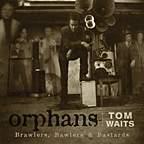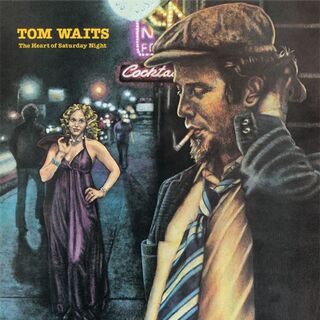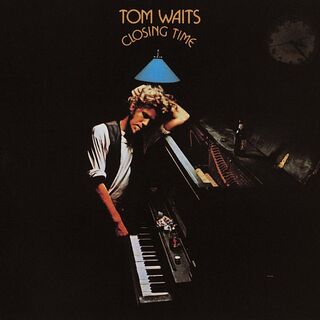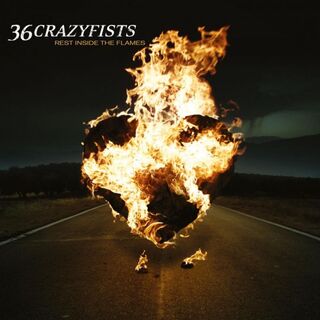"'Orphans' to szorstkie i czułe melodie. Rumby o syrenach, shuffles
o katastrofach kolejowych, tarantelle o owadach, madrygały o tonięciu.
To przestraszone, złe kawałki o ekstazie i melancholii. Kawałki, które
miały twarde dzieciństwo. Kawałki o wątpliwym pochodzeniu wyrwane z rąk
okrutnego losu, a teraz oczekujące odrobiny czułości. Nie bójcie się
przygarnąć ich do waszych domów. One nie gryzą. One tylko potrzebują
uwagi".
Tymi słowami Tom Waits zachęca do zwrócenia uwagi na jego nowy,
trzypłytowy album "Orphans: Brawlers, Bawlers And Bastards", który
zawiera 56 rzadkich nagrań, w tym 30 dotąd niepublikowanych songów oraz
94-stronicową książeczkę. Owe muzyczne "sierotki" Waitsa zostały na
trzech płytach pogrupowane według znajdującego się w podtytule klucza.
Tak więc "Brawlers" zawierać będą utwory bluesowe i knajpiane, "Bawlers"
- celtyckie i folkowe ballady, walce, kołysanki i lamenty, a "Bastards"
- muzykę bardziej eksperymentalną i udziwnioną.
Obok nowego, premierowego repertuaru, na "Orphans" znajdą się
dawniejsze utwory nagrane przez Waitsa do filmów, spektakli teatralnych
i innych artystycznych projektów, realizowanych przez niego
samodzielnie, bądź z żoną - Kathleen Brennan. Warto dodać, że ta
niezwykle twórcza para małżeńska ostatnio uplasowała się na 4. miejscu
na liście "100 najlepszych żyjących autorów piosenek", ogłoszonej przez
wpływowy magazyn "Paste". Oprócz tego na płytach znajdą się oryginalne
interpretacje piosenek innych autorów, w tym tak różnych, jak The
Ramones, Daniel Johnston, Leadbelly, Jack Kerouac czy Kurt Weill i
Bertold Brecht.
When
I was small I always thought that songwriters sat alone at upright
pianos in cramped smoky little rooms with a bottle and an ashtray and
everything came in the window blew through them and came out of the
piano as a song…and in a weird way that is exactly what happens.
What’s
Orphans? I don’t know. Orphans is a dead end kid driving a coffin with
big tires across the Ohio River wearing welding goggles and a wife
beater with a lit firecracker in his ear.
At the center of this
record is my voice. I try my best to chug, stomp, weep, whisper, moan,
wheeze, scat, blurt, rage, whine, and seduce. With my voice, I can sound
like a girl, the boogieman, a Theremin, a cherry bomb, a clown, a
doctor, a murderer…I can be tribal. Ironic. Or disturbed. My voice is
really my instrument.
Kathleen and I wanted the record to be like
emptying our pockets on the table after an evening of gambling,
burglary, and cow tipping. We enjoy strange couplings, that’s how we got
together. We wanted Orphans to be like a shortwave radio show where the
past is sequenced with the future, consisting of things you find on the
ground, in this world and no world, or maybe the next world. Whatever
you imagine that to be.
If a record really works at all, it
should be made like a homemade doll with tinsel for hair and seashells
for ears stuffed with candy and money. Or like a good woman’s purse with
a Swiss army knife and a snake bite kit.
Orphans contains songs
for all occasions. Some of the songs were written in turmoil and
recorded at night in a moving car, others were written in hotel rooms
and recorded in Hollywood during big conflamas. That’s when conflict
weds drama. At any rate these are the ones that survived the flood and
were rescued from the branches of trees after the water’s retreat.
Gathering
all this material together was like rounding up chickens at the beach.
It’s not like you go into vault and check out what you need. Most of it
was lost or buried under the house. Some of the tapes I had to pay
ransom for to a plumber in Russia. You fall into the vat. We started to
write just to climb out of the vat. Then you start listening and sorting
and start writing in response to what you hear. And more recording. And
then you get bit by a spider, go down the gopher hole, and make a whole
different record. That was the process pretty much the last three years.
Then
we met Karl Derfler, a wizard engineer who works at Bay Side Studios in
Richmond, CA, in the science fiction part of town. A battlefield medic,
he did a Lazarus on a number of the songs and recorded all the new
material.
On Orphans there is a mambo about a convict who breaks
out of jail with a fishbone, a gospel train song about Charlie Whitman
and John Wilkes Boothe, a delta blues about a disturbing neighbor, a
spoken word piece about a woman who was struck by lightening, an 18th
century Scottish madrigal about murderous sibling rivalry, an American
backwoods a cappella about a hanging. Even a song by Jack Kerouac and a
spiritual with my own personal petition to the Lord with prayer…There’s
even a show tune about an old altar boy and a rockabilly song about a
young man who’s begging to be lied to.
I think you will
find more singing and dancing here than usual. But I hope fans of more
growling, more warbling, more barking, more screeching won’t be
disappointed either.
Tom Waits
August 2006




